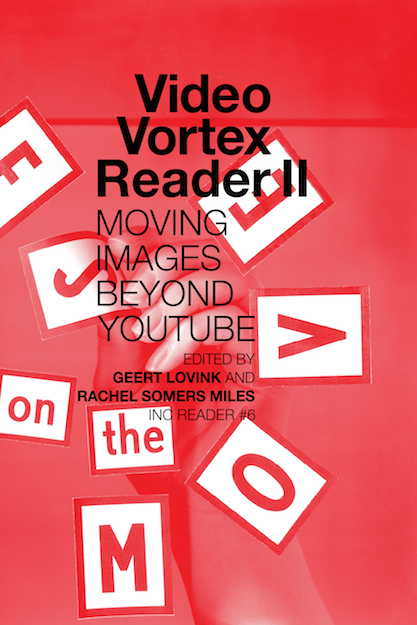Geert Lovink, Rachel Somers Miles (eds.): Video Vortex Reader II: Moving Images Beyond YouTube (2011)
Filed under book | Tags: · aesthetics, human rights, internet, media activism, network culture, online video, politics, theory, video, video art, youtube

“Video Vortex Reader II is the Institute of Network Cultures’ second collection of texts that critically explore the rapidly changing landscape of online video and its use. With the success of YouTube (’2 billion views per day’) and the rise of other online video sharing platforms, the moving image has become expansively more popular on the Web, significantly contributing to the culture and ecology of the internet and our everyday lives. In response, the Video Vortex project continues to examine critical issues that are emerging around the production and distribution of online video content.
Following the success of the mailing list, the website and first Video Vortex Reader in 2008, recent Video Vortex conferences in Ankara (October 2008), Split (May 2009) and Brussels (November 2009) have sparked a number of new insights, debates and conversations regarding the politics, aesthetics, and artistic possibilities of online video. Through contributions from scholars, artists, activists and many more, Video Vortex Reader II asks what is occurring within and beyond the bounds of Google’s YouTube? How are the possibilities of online video, from the accessibility of reusable content to the internet as a distribution channel, being distinctly shaped by the increasing diversity of users taking part in creating and sharing moving images over the web?”
Contributors: Perry Bard, Natalie Bookchin, Vito Campanelli, Andrew Clay, Alexandra Crosby, Alejandro Duque, Sandra Fauconnier, Albert Figurt, Sam Gregory, Cecilia Guida, Stefan Heidenreich, Larissa Hjorth, Mél Hogan, Nuraini Juliastuti, Sarah Késenne, Elizabeth Losh, Geert Lovink, Andrew Lowenthal, Rosa Menkman, Gabriel Menotti, Rachel Somers Miles, Andrew Gryf Paterson, Teague Schneiter, Jan Simons, Evelin Stermitz, Blake Stimson, David Teh, Ferdiansyah Thajib, Andreas Treske, Robrecht Vanderbeeken, Linda Wallace, Brian Willems, Matthew Williamson, Tara Zepel.
Publisher Institute of Network Cultures, Amsterdam, 2011
Creative Commons Attribution Noncommercial No Derivative Works 3.0 Netherlands License
ISBN 9789078146124
378 pages
PDF, PDF (updated on 2017-4-11)
Comment (0)Evgeny Morozov: The Net Delusion: The Dark Side of Internet Freedom (2011)
Filed under book | Tags: · activism, democracy, internet, internet activism, media activism, revolution, technology, twitter, web 2.0

The internet will set us free—or will it? In this spirited critique of “internet freedom,” blogger and commentator Evgeny Morozov shows how social media and web 2.0 do not always foster civic engagement and democratic reform. In fact, the net can make authoritarian governments even more powerful and repressive.
“The revolution will be Twittered!” declared journalist Andrew Sullivan after protests erupted in Iran in June 2009. Yet for all the talk about the democratizing power of the Internet, regimes in Iran and China are as stable and repressive as ever. In fact, authoritarian governments are effectively using the Internet to suppress free speech, hone their surveillance techniques, disseminate cutting-edge propaganda, and pacify their populations with digital entertainment. Could the recent Western obsession with promoting democracy by digital means backfire?
In this spirited book, journalist and social commentator Evgeny Morozov shows that by falling for the supposedly democratizing nature of the Internet, Western do-gooders may have missed how it also entrenches dictators, threatens dissidents, and makes it harder—not easier—to promote democracy. Buzzwords like “21st-century statecraft” sound good in PowerPoint presentations, but the reality is that “digital diplomacy” requires just as much oversight and consideration as any other kind of diplomacy.
Marshaling compelling evidence, Morozov shows why we must stop thinking of the Internet and social media as inherently liberating and why ambitious and seemingly noble initiatives like the promotion of “Internet freedom” might have disastrous implications for the future of democracy as a whole.
Publisher PublicAffairs, 2011
ISBN 1586488740, 9781586488741
432 pages
commentary (Cory Doctorow, The Guardian)
PDF (PDF; updated 2012-7-15)
PDF (EPUB; updated 2012-7-15)
Daniel Domscheit-Berg: Inside WikiLeaks. Meine Zeit bei der gefährlichsten Website der Welt (2011) [German]
Filed under book | Tags: · activism, diplomacy, internet, media activism, military, politics, war, wikileaks

Die Enthüllungen von WikiLeaks halten die Welt in Atem. Doch wer steckt hinter der Organisation, die die Mächtigen fürchten macht und das Pentagon eine 120 Mann starke Task Force einberufen ließ? Wie sieht es aus in der Schaltzentrale von WikiLeaks und welche brisanten Papiere schlummern dort noch?
Daniel Domscheit-Berg nimmt uns mit ins Herz von WikiLeaks. Er hat die Enthüllungsplattform seit 2007 Seite an Seite mit Julian Assange aufgebaut. Der junge Deutsche ist weltweit der Mann, der neben dem schillernden und zunehmend umstrittenen Gründer den besten Einblick in das Whistleblower-Projekt hat. Seit Domscheit-Berg und andere Mitstreiter sich im Herbst 2010 aus dem Projekt zurückzogen, ist Julian Assange alleiniger Herrscher über dieses machtvolle Instrument.
Inside WikiLeaks ist ein packend geschriebener Enthüllungsreport voller unbekannter Fakten. Er erzählt die Geschichte von WikiLeaks, wie sie noch keiner gehört hat.
Written by Tina Klopp
Publisher: Econ Verlag, Ullstein Buchverlage, Berlin, 2011
ISBN 978-3-8437-0062-7
304 pages
PDF (EPUB; updated on 2012-8-5)
Comment (0)
